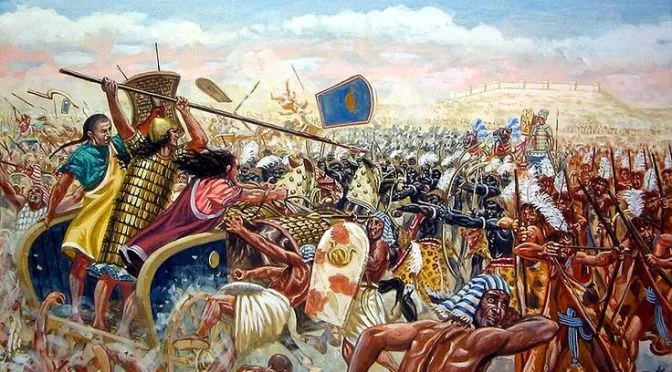The Bible, a complex and multifaceted text, contains passages that have been interpreted in various ways throughout history. Some of the most challenging verses deal with what appear to be divine commands for the Israelites to wipe out entire populations. However, a closer look at these passages, along with other biblical teachings, reveals a more nuanced understanding of God’s character and intentions.
Moving Beyond Literal Interpretations
It’s crucial to recognize that the Bible was written in a specific historical and cultural context. Concepts like “genocide” in the modern sense didn’t exist then. Often, the Hebrew terms used refer to military campaigns against enemy nations, with the complete destruction of their settlements and armies.
Furthermore, interpreting these passages literally can raise serious theological concerns. How can a loving and merciful God command the killing of innocent people? This apparent contradiction has led many scholars and theologians to re-examine these verses within the broader context of the Bible’s message.
God’s Consistent Character of Love and Mercy
Throughout the scriptures, God is overwhelmingly portrayed as a being of love, compassion, and forgiveness. Verses like John 3:16 (“For God so loved the world that he gave his one and only Son, that whoever believes in him shall not perish but have eternal life.”) and Psalm 103:8 (“The Lord is merciful and gracious, slow to anger and abounding in steadfast love.”) paint a clear picture of God’s character.
Examining Specific Passages
Let’s consider some of the most commonly cited “genocide” verses:
- Deuteronomy 7:1-2: “When the Lord your God brings you into the land you are entering to possess it, and he drives out before you many nations—the Hittites, the Girgashites, the Amorites, the Canaanites, the Perizzites, the Hivites, and the Jebusites—seven nations greater and mightier than you—and the Lord your God delivers them over to you to be defeated, you must completely destroy them.”
While this verse seems like a direct command for annihilation, several factors suggest a different interpretation. Firstly, the context involves these nations practicing brutal religious rituals, including child sacrifice, which God rightfully condemns. In Deuteronomy 20:18 the reason for the expulsion of these nations is “that they may not teach you to do according to all their abominable practices that they have done for their gods, and so you sin against the Lord your God.” Secondly, the complete destruction refers to dismantling their societal structures and religious practices, not necessarily the indiscriminate killing of every individual. Thirdly, God is going to drive them out of the land, which is often what the meaning ‘devoted to destruction’ or the Hebrew word ‘Herem’ (חרם) conveys.
- Joshua 11:21-22: 21And Joshua came at that time and cut off the Anakim from the hill country, from Hebron, from Debir, from Anab, and from all the hill country of Judah, and from all the hill country of Israel. Joshua devoted them to destruction with their cities. 22 There was none of the Anakim left in the land of the people of Israel. Only in Gaza, in Gath, and in Ashdod did some remain.
According to these verses, Joshua killed all the Anakim living in Hebron and Debir. It is therefore interesting to note that just four chapters after in chapter 15, we read that Caleb drove out the Anakim in Hebron and Debir.
Verses 13-15 read: 13 According to the commandment of the Lord to Joshua, he gave to Caleb the son of Jephunneh a portion among the people of Judah, Kiriath-arba, that is, Hebron (Arba was the father of Anak). 14 And Caleb drove out from there the three sons of Anak, Sheshai and Ahiman and Talmai, the descendants of Anak. 15 And he went up from there against the inhabitants of Debir.
If the Amorites had been utterly destroyed in Hebron and Debir, why were some of them still alive? There seems to be something going here other than literal annihilation or total killing of all the people group.
- Joshua 10:21-22: In fact, in Joshua 10:20-21, we learn:
20 When Joshua and the sons of Israel had finished striking them with a great blow until they were wiped out, and when the remnant that remained of them had entered into the fortified cities, 21 then all the people returned safe to Joshua in the camp at Makkedah.
Here we have, in one sentence, Joshua wiping out the Amorites, but then the remnant of the Amorites, who had supposedly been wiped out, entering the fortified cities. Upon careful examination of the text, this ‘herem’ or being devoted to destruction is not primarily about the literal slaughter of Canaanite groups, rather driving out or dispossessing these wicked nations.
God’s Redemptive Purpose
Ultimately, the Bible portrays God as a being who desires restoration and reconciliation. Even in moments of judgment, his ultimate goal is to bring people back to himself and establish a kingdom of love and justice. Passages like Ezekiel 18:23 (“For I take no pleasure in the death of the wicked, but rather that the wicked should turn from their ways and live.”) emphasize God’s redemptive heart. God is loving and just, for how could he be loving and not be just?
Comparison of Ancient Near East War Reports
To further strengthen the idea that destroy or devote to destruction does not refer to mass slaughter, we can compare the Hebrew text to other contemporary ancient near eastern war texts and see that the same type of language was used to describe battles. This type of language can be termed ancient war rhetoric, or in modern day terminology, a kind of bragging rights. Sports team around the world are said to destroy, slaughter or even annihilate their opponent. Clearly, they did not literally wipe them out.
Let’s look at a few examples.
- The Egyptian Pharoah Tuthmosis III in around 1500BC declared: “the numerous army of Mitanni was overthrown within the hour, annihilated totally, like those now not existent.” However, the Mitanni were around for at least 200 years after this proclamation.
- The Egyptian Pharoah Merneptah in around 1230BC wrote: “Israel is wasted, his seed is not.” Clearly, Israel survived.
- The Moabite King Mesha in around 840BC wrote that the Northen Kingdom of Israel had been “utterly perished for always”.
Conclusion: A Nuanced Understanding
Instead of viewing the seemingly “genocidal” passages as isolated commands, we must interpret them within the broader context of the Bible’s message. God’s character of love and mercy remains constant, even amidst pronouncements of judgment. He is a just God who holds evil accountable but also a compassionate God who desires the salvation of all.
By moving beyond literal interpretations of mass slaughter and instead view them as ancient war rhetoric and a focus more on the driving out of the nations, as well as considering the overall themes of the Bible, we gain a more nuanced understanding of these challenging passages. This understanding allows us to reconcile God’s justice with his love and mercy, painting a more comprehensive picture of his divine character.
Remember, the Bible is a complex and multifaceted text, and different interpretations can coexist. This blog post is just one perspective on a challenging topic. It’s important to continue engaging in thoughtful and respectful dialogue as we seek to understand the Bible’s message in its entirety.
I hope this article provides a starting point for further exploration and reflection. Feel free to share your thoughts and questions in the comments below.




